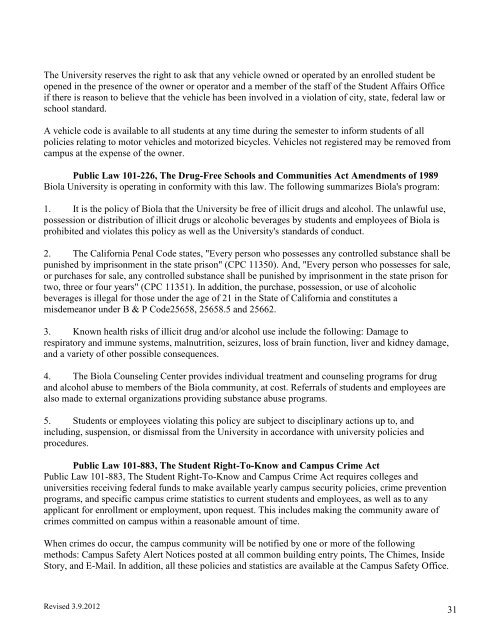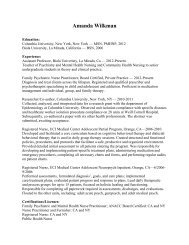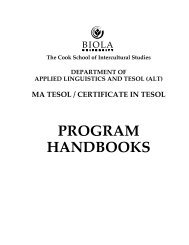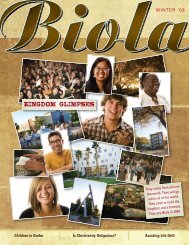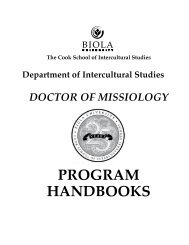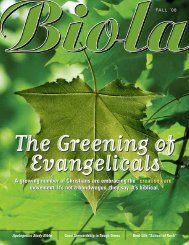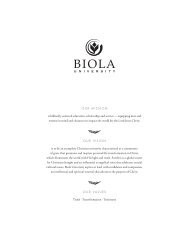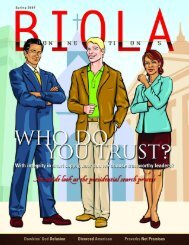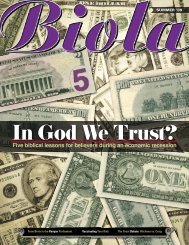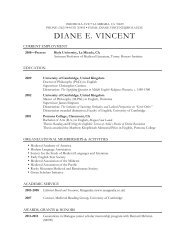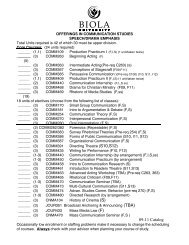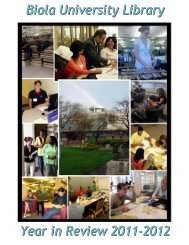GRADUATE STUDENT HANDBOOK - Biola University
GRADUATE STUDENT HANDBOOK - Biola University
GRADUATE STUDENT HANDBOOK - Biola University
You also want an ePaper? Increase the reach of your titles
YUMPU automatically turns print PDFs into web optimized ePapers that Google loves.
The <strong>University</strong> reserves the right to ask that any vehicle owned or operated by an enrolled student be<br />
opened in the presence of the owner or operator and a member of the staff of the Student Affairs Office<br />
if there is reason to believe that the vehicle has been involved in a violation of city, state, federal law or<br />
school standard.<br />
A vehicle code is available to all students at any time during the semester to inform students of all<br />
policies relating to motor vehicles and motorized bicycles. Vehicles not registered may be removed from<br />
campus at the expense of the owner.<br />
Public Law 101-226, The Drug-Free Schools and Communities Act Amendments of 1989<br />
<strong>Biola</strong> <strong>University</strong> is operating in conformity with this law. The following summarizes <strong>Biola</strong>'s program:<br />
1. It is the policy of <strong>Biola</strong> that the <strong>University</strong> be free of illicit drugs and alcohol. The unlawful use,<br />
possession or distribution of illicit drugs or alcoholic beverages by students and employees of <strong>Biola</strong> is<br />
prohibited and violates this policy as well as the <strong>University</strong>'s standards of conduct.<br />
2. The California Penal Code states, "Every person who possesses any controlled substance shall be<br />
punished by imprisonment in the state prison" (CPC 11350). And, "Every person who possesses for sale,<br />
or purchases for sale, any controlled substance shall be punished by imprisonment in the state prison for<br />
two, three or four years" (CPC 11351). In addition, the purchase, possession, or use of alcoholic<br />
beverages is illegal for those under the age of 21 in the State of California and constitutes a<br />
misdemeanor under B & P Code25658, 25658.5 and 25662.<br />
3. Known health risks of illicit drug and/or alcohol use include the following: Damage to<br />
respiratory and immune systems, malnutrition, seizures, loss of brain function, liver and kidney damage,<br />
and a variety of other possible consequences.<br />
4. The <strong>Biola</strong> Counseling Center provides individual treatment and counseling programs for drug<br />
and alcohol abuse to members of the <strong>Biola</strong> community, at cost. Referrals of students and employees are<br />
also made to external organizations providing substance abuse programs.<br />
5. Students or employees violating this policy are subject to disciplinary actions up to, and<br />
including, suspension, or dismissal from the <strong>University</strong> in accordance with university policies and<br />
procedures.<br />
Public Law 101-883, The Student Right-To-Know and Campus Crime Act<br />
Public Law 101-883, The Student Right-To-Know and Campus Crime Act requires colleges and<br />
universities receiving federal funds to make available yearly campus security policies, crime prevention<br />
programs, and specific campus crime statistics to current students and employees, as well as to any<br />
applicant for enrollment or employment, upon request. This includes making the community aware of<br />
crimes committed on campus within a reasonable amount of time.<br />
When crimes do occur, the campus community will be notified by one or more of the following<br />
methods: Campus Safety Alert Notices posted at all common building entry points, The Chimes, Inside<br />
Story, and E-Mail. In addition, all these policies and statistics are available at the Campus Safety Office.<br />
Revised 3.9.2012 31


